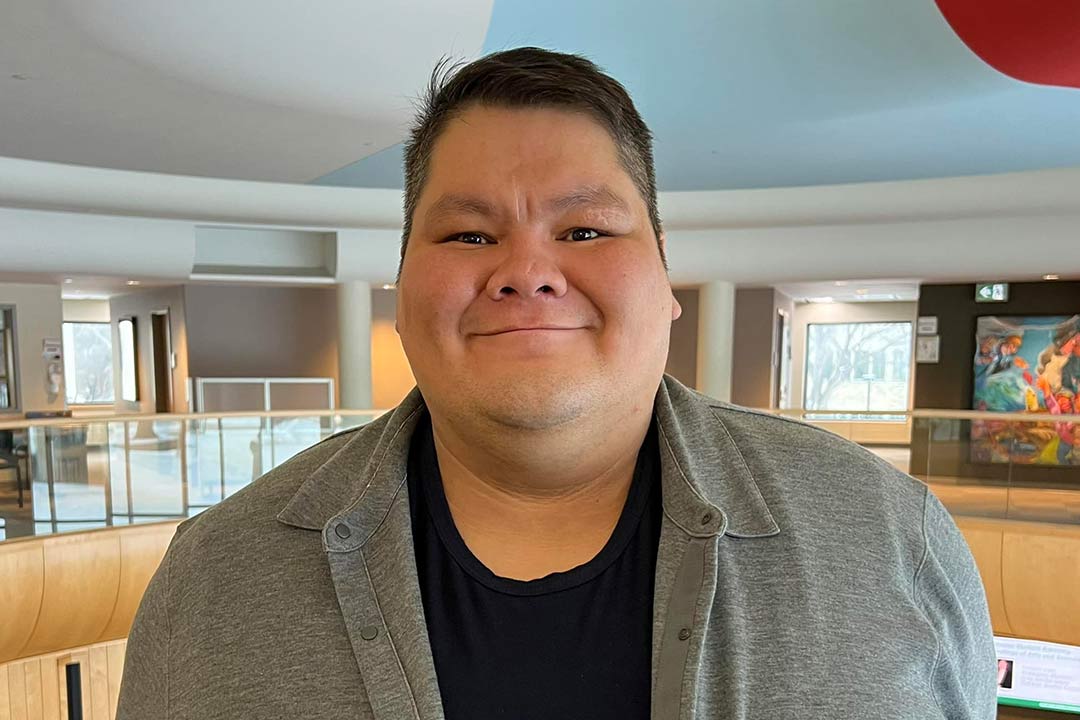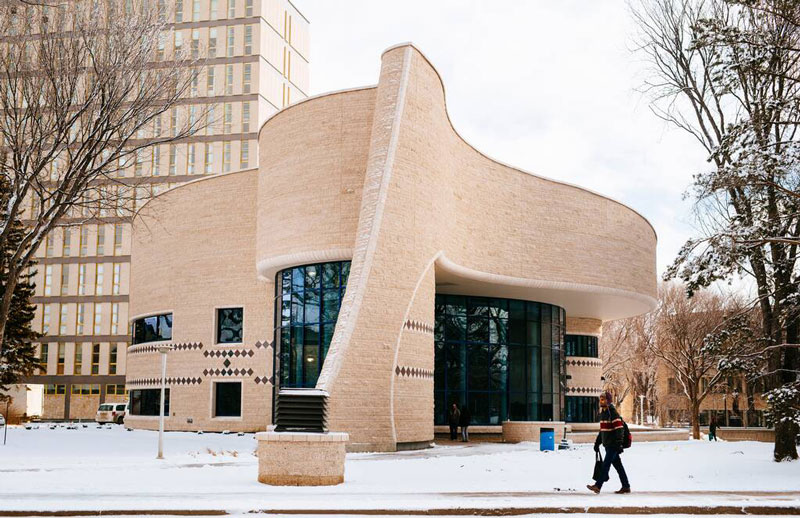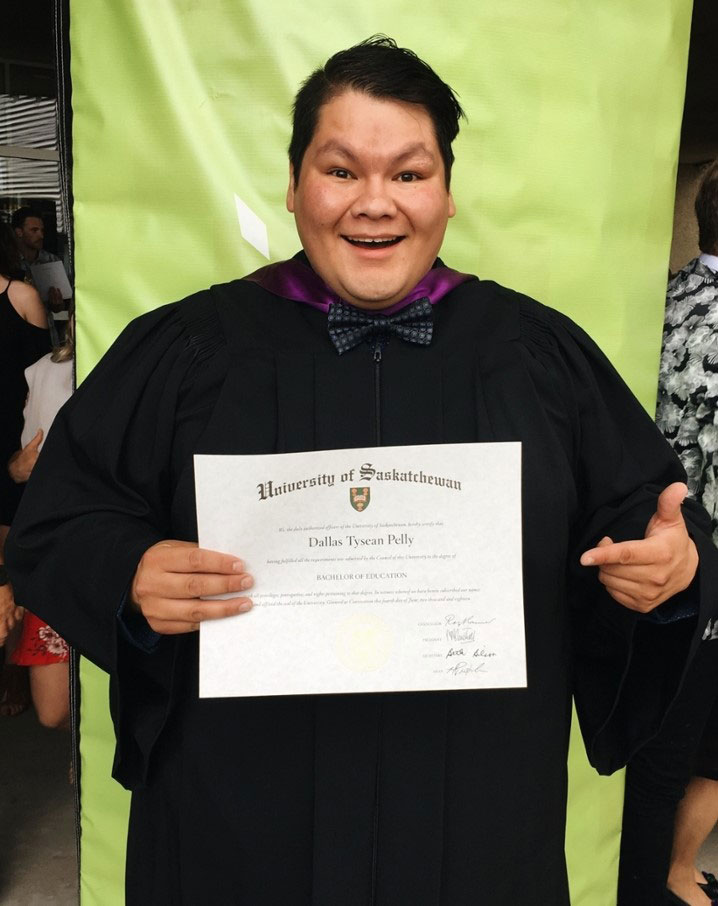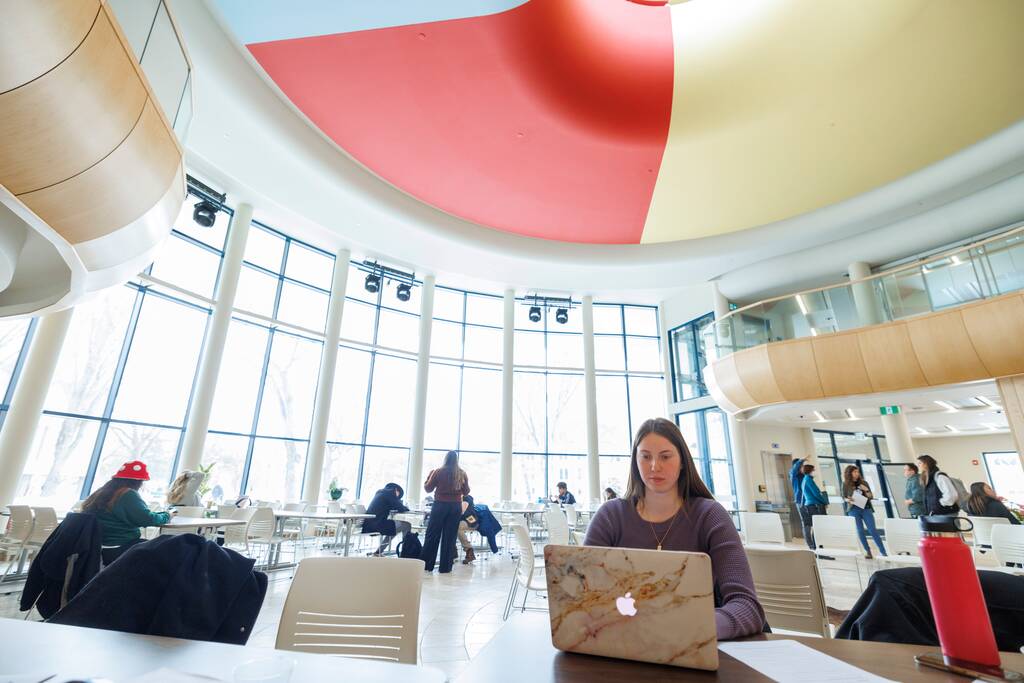
USask alumnus to lead Gordon Oakes Red Bear Student Centre
“For me, this role is really a coming home,” says Dallas Pelly (BEd’18), a graduate of the Indian Teacher Education Program (ITEP)
By SHANNON BOKLASCHUKUniversity of Saskatchewan (USask) graduate Dallas Pelly (BEd’18) experienced a “full-circle moment” when he became the director of the Gordon Oakes Red Bear Student Centre earlier this month.
“For me, this role is really a coming home,” said Pelly, who began his new job on Jan. 6. “This place was a home for me as a student—and so for me now, in my career, to come and give back is a really fruitful and meaningful part of my career journey.”
The Gordon Oakes Red Bear Student Centre, located on USask’s main campus in Saskatoon on Treaty Six Territory and the Homeland of the Métis, opened in 2016 and is dedicated to supporting the personal, social, cultural, and academic success of Métis, First Nations, and Inuit students.
The building is named after Gordon Oakes Red Bear, a spiritual and community leader who guided many in his community and across Saskatchewan. Oakes was born in 1932, in what is now the Nekaneet First Nation, and passed away in early 2002. He believed in Indigenous and non-Indigenous peoples working together for each other’s mutual benefit, using the analogy of a team of horses pulling together and living in balance to impart this teaching.

“The Gordon Oakes Red Bear Student Centre is such a special place,” said Pelly. “The vision of Gordon Oakes was for it to be an intercultural gathering place where Indigenous and non-Indigenous people can work together and move forward in a good way. I love that gift of that term ‘We are all Treaty people’ because that’s not just Indigenous people; that’s all of us. We all inherited this Treaty relationship, so how do we move forward in that good way? And I think Gordon Oakes embodies that.”
Pelly encourages Indigenous and non-Indigenous USask community members to connect and to build relationships together at the Gordon Oakes Red Bear Student Centre through events such as the centre’s soup and bannock lunches.
“We have programming that’s tailored to Indigenous students, for an Indigenous population, but this is also a gathering place for many people—and soup and bannock leads to amazing conversations, time together, time to reflect, and to work on building good relations,” he said.

Pelly, a member of the Cote First Nation on Treaty Four Territory, grew up in Saskatoon and first came to USask as a student in the Indian Teacher Education Program (ITEP) in the College of Education. A self-described proud USask alumnus, he earned his Bachelor of Education degree in 2018 and has been making positive change as an Indigenous educator, community builder, and social innovator ever since.
Pelly said “it was such an easy choice” to join ITEP as a USask student. He was inspired by his many family members who had previously enrolled in the program, including his aunt, Judy Pelly (BEd’85), a 2024 recipient of the Lifetime Achievement Award—the highest honour presented by the University of Saskatchewan Alumni Association.
“For me, it was just absolutely an incredible honour to join that cohort of amazing Indigenous educators,” Dallas Pelly said.
Pelly found a sense of community at ITEP and served as the ITEP student body president for a year. He also received an award for leadership as an undergraduate student and quickly obtained employment in his field post-graduation.
For instance, the day after Pelly finished his internship through the College of Education, he started a “dream job”—working as an Indigenous educator for Connected North. Since then, he has also worked with the Saskatoon Tribal Council and the Saskatchewan Indian Institute of Technologies (SIIT). More recently, he was employed at the Canadian Light Source (CLS), Canada’s only synchrotron. In his role as education specialist – Indigenous relations at the CLS, Pelly introduced Indigenous students to science, technology, engineering, and mathematics (STEM) research careers. His work there, with The Berry Project, involved integrating Traditional Knowledge and mainstream science into experiences designed to engage First Nations, Métis, and Inuit teachers, students, and communities. For Pelly, working at the CLS was a “mind-blowing” experience and he believes his USask education prepared him well for that role.
"Indigenous people are underrepresented in STEM—so in no way did I (originally) see myself in a research centre like the Canadian Light Source—but the university equipped me with the knowledge and tools as an Indigenous person to know that we can exist in spaces like the Canadian Light Source,” he said. “So, my goal, my mandate, was to try and grow as much as we can the Indigenous participation in STEM.”
In his new role at the Gordon Oakes Red Bear Student Centre, Pelly will continue to advocate for greater Indigenous representation in STEM. He also vows to work with the staff at the centre, and with the larger USask campus community, to ensure that Indigenous students are supported personally, socially, culturally, and academically throughout their educational journeys.
“I want the Indigenous students on this campus to feel like they have home here, that they’re valued, and that their voices are heard,” he said.

In his first few weeks as the centre’s director, Pelly has focused on reconnecting with people he knew as a student and on fostering new relationships. He has many great things to say about the staff team he works with, and he has a special connection with Lori Ann Delorme, the centre’s Indigenous student services manager. Delorme previously worked at the Aboriginal Students’ Centre (ASC)—a predecessor to the Gordon Oakes Red Bear Student Centre on the USask campus—and it was at the ASC that Pelly and Delorme first met years ago.
“She actually was one of my first contacts as an undergraduate student,” Pelly recalled. “I wandered over to the old Aboriginal Students’ Centre and she was the first-year coordinator and she supported me from day one.
“So I truly say it’s a full-circle moment that I now get to work with Lori, and with the team here, to complete that journey and help students who are like myself—who didn’t have a strong connection to their culture, didn’t know where they fit in on campus, and felt like they didn’t fit in an institution like this. She and the staff provided that grounding place (for me), so, this is my way of giving back.”
Outside of his role on campus, Pelly is a busy father of three young sons, ages three, six, and nine. He hopes that his children will one day attend USask, and he wants to continue to work with others to ensure the university is a great place for Indigenous students in the future. During his first week as the director of the Gordon Oakes Red Bear Student Centre, Pelly attended a round dance hosted by the Indigenous Business Students’ Society. He invited his son, Oaklen, to attend, and it was a heartwarming day.
“This was the first time where I saw him participating in ceremony himself—not attached to me. He was the one initiating the dance; he was the one that was taking tea to the Elders and bannock to the Elders,” he said. “I think him being part of this community, and even seeing this building, was really a sense of pride for him that his dad’s the director.”
In his new role, Pelly’s overarching goal is to connect with students. He wants to hear their perspectives as he works to address important issues, such as food insecurity, mental health supports, and access to cultural and academic supports through the centre. His door is always open, and he hopes to hold some formal discussions with students as well.
Pelly said he personally feels “supported and invested in, as part of this university,” and he wants to collaborate with others across USask to ensure that current and future Indigenous students—such as his sons—are also welcomed and supported on the campus he calls home.
“I want them to come into a healthy place, a healthy institution, and a place that embodies the teaching of Mino-Pimatisiwin, or living a good balanced life,” he said.
Together, we will work towards Truth and Reconciliation. We invite you to join by supporting Indigenous achievement at USask.


